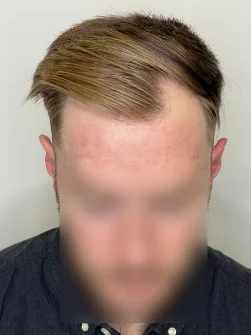Introduction
Hair transplants are an effective and permanent solution for restoring thinning or receding areas. However, many patients worry about losing hair after a hair transplant. What happens if you notice further thinning or shedding after your procedure? Understanding why this occurs, what is normal, and when to seek advice can ease concerns and support your hair restoration journey.
Is It Normal to Lose Hair After a Transplant?
Yes, losing hair after a hair transplant can be part of the natural process. Around two to four weeks post-surgery, patients often experience what is known as shock loss. This refers to temporary shedding of transplanted and surrounding hairs due to the trauma of surgery. It is a normal stage of healing, and hair typically regrows stronger within a few months.
What is Shock Loss?
Shock loss happens when the scalp reacts to the transplant procedure. The hair follicles enter a resting phase, causing shedding before they begin a new growth cycle. Patients can feel alarmed seeing shedding soon after their transplant, but this does not mean the procedure has failed. In most cases, hair begins to regrow from month three onwards and continues to thicken up to twelve months post-surgery.
For further details on the hair growth process, read our blog on how long hair transplants take to grow.
Why Might You Lose Existing Hair After a Transplant?
Hair transplants move strong, DHT-resistant follicles to thinning areas. However, surrounding non-transplanted hair can continue to thin over time due to ongoing hair loss. This is especially true for patients with progressive male or female pattern baldness. The transplanted hair will remain, but untreated hair nearby can continue to recede, affecting overall density.
Some patients also experience temporary thinning in areas near the transplant site because of surgical trauma, even if they were not directly treated. This usually resolves over a few months as hair regrows naturally.
Managing Ongoing Hair Loss After a Transplant
To maintain your results, surgeons may recommend complementary treatments. These include:
- Medications such as Finasteride or Minoxidil to slow hair loss
- PRP therapy to nourish existing follicles and strengthen hair
- Low-level laser therapy to improve scalp health and stimulate follicles
- Regular follow-ups to plan touch-up sessions if required in the future
Combining treatments ensures transplanted hair blends seamlessly with surrounding strands, preserving a fuller and natural-looking appearance. Learn more about our PRP therapy treatments.
Lifestyle Factors That Affect Hair Loss After a Transplant
Patients often overlook how everyday habits can impact hair health after a transplant. Diet plays a crucial role, as nutrients such as protein, biotin, zinc, and iron support hair growth and scalp health. Without sufficient intake, hair may appear thinner or weaker over time. Including foods like eggs, nuts, leafy greens, and fish in your meals helps maintain strong hair strands and supports overall recovery.
Hydration is equally important. Drinking enough water daily keeps the scalp hydrated, preventing dryness or irritation that could affect transplanted follicles. Patients should also limit excessive caffeine and alcohol consumption, as these can dehydrate the body and impact nutrient absorption.
Stress management is another essential factor. High stress levels increase cortisol production, which may trigger hair shedding. Incorporating relaxation techniques such as meditation, light exercise, or breathing exercises into your routine helps balance hormones and supports hair health.
Finally, using gentle hair care products ensures transplanted and existing hair remains strong. Avoid harsh shampoos with sulphates and limit the use of heated styling tools. Fortes Clinic specialists often recommend specific shampoos and conditioners designed for sensitive scalps after hair transplant surgery to protect your investment and maintain natural-looking results.
When Should You Be Concerned About Hair Loss After a Transplant?
While shock loss is normal, patients should contact their surgeon if they notice:
- Excessive shedding lasting beyond four months
- Unusual scalp redness, pain, or infection signs
- No signs of regrowth by month six
- Large patches of hair thinning not related to the transplant site
Fortes Clinic offers thorough follow-up appointments to monitor growth and ensure results are on track. If you notice any of these signs, seeking early professional advice can help identify solutions quickly.
Emotional Impact of Further Hair Loss
Losing hair after a hair transplant can be stressful. Patients may feel worried that their investment has failed or that further hair loss will undo their results. Understanding the normal growth timeline and having realistic expectations can reduce anxiety. At Fortes Clinic, surgeons provide detailed guidance on what to expect at every stage of recovery.
If you are concerned about appearance changes in the months following surgery, speaking to your specialist can provide reassurance and tailored recommendations to support your confidence.
Long-Term Planning for Hair Restoration
Hair transplants offer permanent results for the treated areas, but hair loss is a lifelong condition. Patients benefit from planning their hair restoration with future loss in mind. Surgeons often create conservative hairlines to accommodate age-related recession and recommend maintenance therapies to preserve existing hair.
Some patients may require a second transplant years later if further hair thinning develops in untreated areas. Planning this possibility from the start ensures your hair restoration remains natural and suits your appearance as you age.
Final Thoughts
Losing hair after a hair transplant is common, especially due to temporary shock loss. Transplanted follicles are secure and will begin to regrow within a few months. If you experience ongoing shedding beyond the expected timeframe, or if your surrounding hair continues to thin, follow-up consultations and additional treatments can help maintain your desired results.
Contact Fortes Clinic
If you are concerned about losing hair after a hair transplant or want to learn more about maintaining long-term results, contact Fortes Clinic today to book your consultation with our hair restoration specialists.



